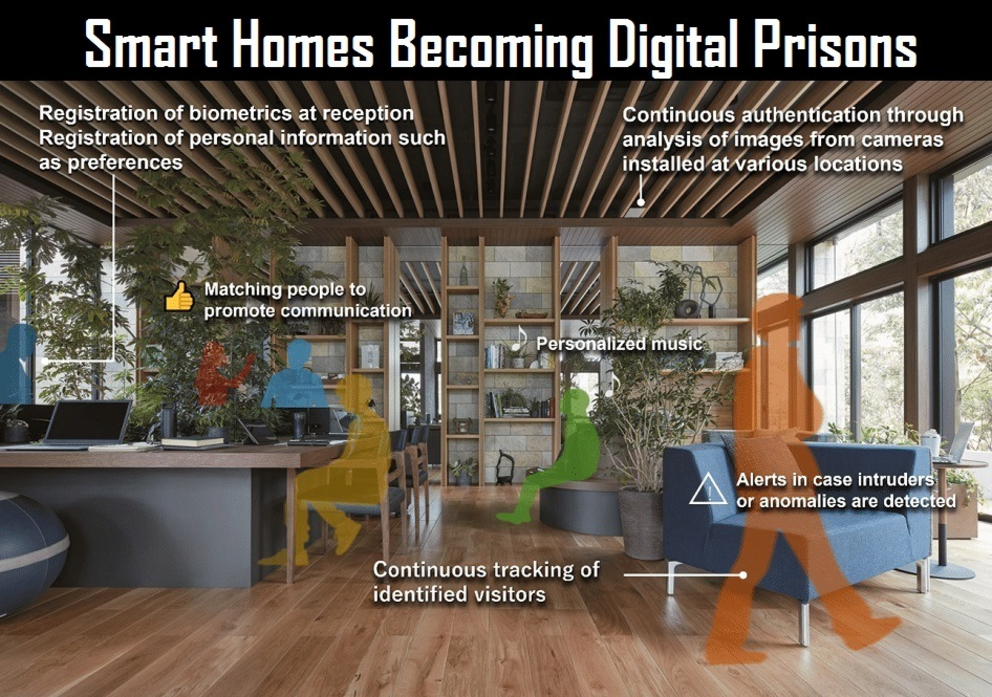Digital concentration camps: how biometrics are making our homes virtual prisons in preparation for the next ‘lockdowns’
All visitors have to register via biometrics, such as palm scans, face scans, eye scans, etc., before they are allowed to enter. Once they enter, they are continually monitored via cameras and microphones that monitor one’s biometrics while on the premises. Anyone who approaches the premises is picked up by cameras that immediately seek to identify who the person is before allowing entrance.
Did I just describe how one visits a friend or relative who is incarcerated in a jail, prison or mental ward, or did I just describe how new “smart homes” operate?
Actually, both. And that’s the point.
The public is voluntarily surrendering their privacy for the sake of “convenience” and “security,” while not understanding that what they are trading in for these “conveniences” and illusions of “security” is the ability for government agents to lock them down in their own homes, just as they lock down prisoners in jails, hospitals, mental institutions, and other places of incarceration.
And for those of you who believe what I am writing here is an overstated “conspiracy theory,” you have very short memories.
It was just 3 years ago when most of the world was locked down in their homes all in the name of “COVID.”
COVID was simply a trial run to learn just how far the public would be willing to go to surrender their freedoms and ability to move around as a response to the fear that was being broadcast 24/7 around COVID.
The medical tyrants had tried for years, unsuccessfully, to lock down populations over fear from a deadly “virus,” including but not limited to ebola, zika, swine flu, bird flu, and many others.
What made COVID a success, was the fact that in the metropolitan area of Wuhan, China, 50 million people voluntarily agreed to stay at home and self lock down over this alleged, “new”, coronavirus.
It was the first time this had ever happened, and it provided a blueprint for the rest of the world.
The name of the alleged “virus” was actually inconsequential.
The news that created fear and allowed the entire world to lock down their populations, was the fact that 50 million people in a large city in China feared this “new virus” so much, that they volunteered to stay in their homes.

Later, the populations of the largest cities in China were incarcerated in their own homes by force, prompting many to commit suicide.
Thus, COVID became the great human experiment, with tremendous success for the medical mafia and their little political tyrants.
If you think that they would never do something like that again, then you are not living in reality.
And the next time they roll out a “new” scripted “pandemic” it will be far easier to control the masses.
This is because the main thing that has changed in the past 3 years is that the technology has rapidly advanced in biometrics, and the data on the Internet is being collated and filtered for the new AI Large Language Models (LLM), so that they can control what you are able to search for and view on the Internet as well, as you are locked down in your digital homes prisons.
“Smart” Homes are Virtual Digital Prisons
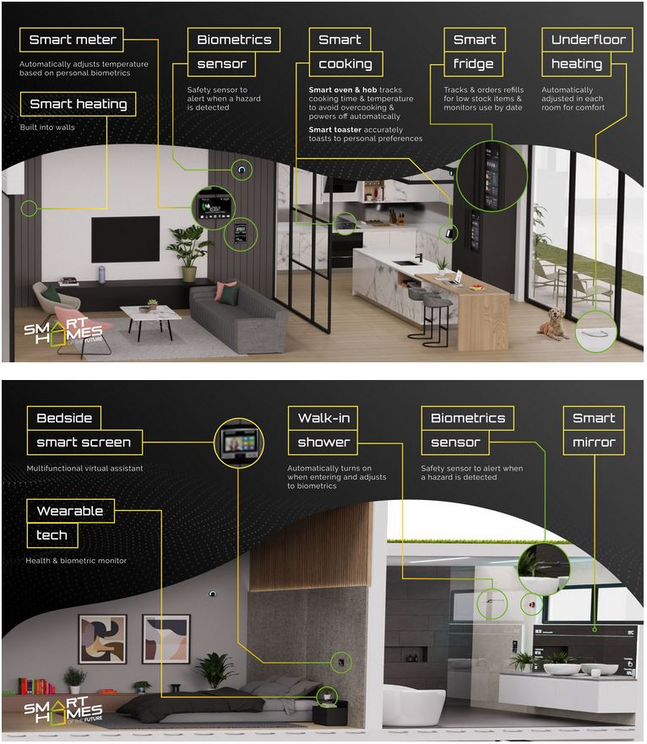
Big Tech companies are now rolling out the blueprints for these “smart homes”/digital prisons with “continuous authentication” using biometrics.
Fujitsu pilots model house that can authenticate anyone, anywhere, all the time
You can add “continuous authentication” to your biometric lexicon, as the Japanese firms Fujitsu and Misawa Homes team up for joint trials of a model house that provides visitors and residents with customized experiences based on biometric data.
According to a company release, sensors installed in shared spaces “identify residents and visitors through cues like their clothing or posture.”
“By continuously identifying people and their movements in the surrounding environment,” says the release, “the technology can help to detect emergency situations including falls and possible injuries of residents or visitors as well as unidentified intruders, to ultimately contribute to the realization of safer housing.”
While the companies say they will explore deployments in high-risk areas such as hospitals and nursing homes, they also have more generalized plans for the system, including cashless payments, personalized office spaces, and bespoke home living.
“The two companies are further conducting trials leveraging this technique to realize personalized living spaces tailored to residents’ personal preferences and needs,” says the release, which includes an illustration of how “continuous authentication through analysis of images from cameras installed at various locations” can be used to call up personalized music, or track visitors throughout the duration of their stay.
To make the system work, Fujitsu’s Actlyzer technology senses and analyzes peoples’ movements and links them with biometric authenticators such as facial recognition or palm vein data.
The release explains that “the tracking of a person across multiple cameras remains difficult for conventional technologies because of variations caused by the positioning of cameras.
To resolve this challenge, the newly developed technology enables identification of a person from multiple images based on features like clothing and a person’s posture regardless of other variations in lighting, etc.”
In other words, the system patches over dead angles by aggregating the two types of identifying data.
“All authentication processes run in the cloud,” says the release, “and results are sent to devices installed in a certain area.” (Full article.)
Nothing, and I do mean NOTHING, will be private in your home anymore if you foolishly pay for such a home and surrender all your biometrics to “the Cloud” for monitoring.
And if you don’t comply with future medical mandates when the next “killer virus” starts circulating through the corporate media, you will easily lose the ability to use your new “smart home” as it becomes your prison.
Not only are biometrics increasingly being used to control people’s residence, they are also being used to track and control people as well. This includes not only your “smart phone” that you carry around, but also “wearables,” including “smart clothing,” that monitor your health as well.
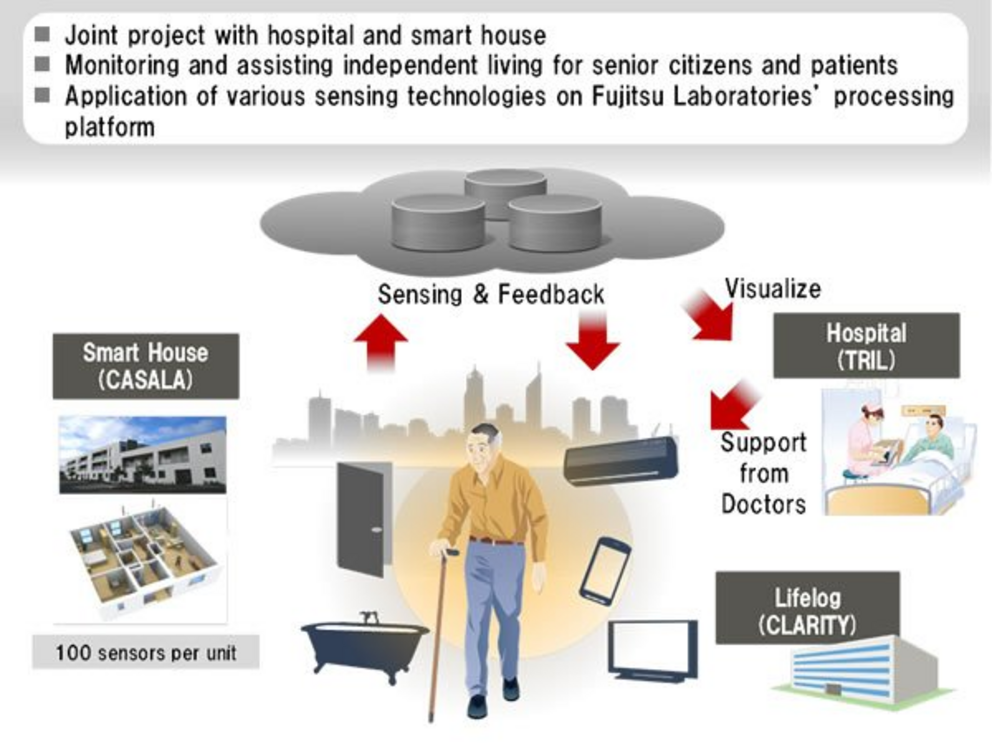
No longer will you need to visit an emergency room or check into a hospital to be medically kidnapped – they will do it right in your own home.
British Business Bank’s Future Fund invests in B-Secur’s heartbeat biometrics
B-Secur, a biometric algorithm developer based in Belfast, is one of 67 UK companies in which the British Business Bank’s Future Fund has recently invested for equity interest.
Northern Ireland-based B-Secur is pioneering next-generation biometrics, using the heart to secure health & wellness insights in the connected world.
The company’s HeartKey technology captures users’ ECG signals using small, seamless sensors in smart clothing, wearables, or physical touch points.
The resulting signal patterns provide insights into the individual, from confirming who they are to how they feel.
Applications include improving motor safety, medical monitoring outside a clinical setting and improvements in worker verification, security, and well-being.
In recent years, the company has experienced significant growth, particularly after receiving approval from the U.S. Food and Drug Administration (FDA) for its HeartKey software. (Full article. Emphasis mine.)
Controlling Access to Your Money
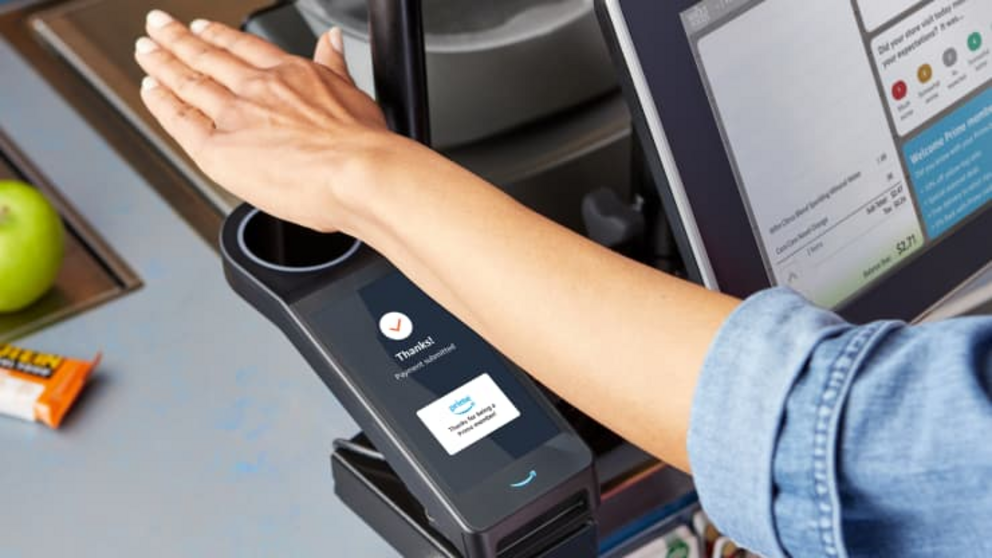
The most immediate danger this technology poses, in my opinion as a technologist who has earned my living off of the technology for the past 25+ years, is the use of biometrics to access your bank and financial accounts.
This technology is already in place, and its implementation is imminent.
If your bank or employer required you to surrender your biometrics to have access to your money tomorrow, would you comply? Would you allow them to scan your palm, your face, the irises of your eyes, or even provide a DNA sample of your blood, in order to access your money?
My guess is that 99% of you reading this today would comply.
And technology biometric providers are rushing to be the company that collects and stores your biometrics in the financial sector.
Liminal sees opportunities in financial services onboarding landscape
Market intelligence firm Liminal has published a list of the top 32 companies working in compliance and fraud prevention for onboarding.
“While many providers are actively developing key capabilities, no single vendor has dominated the market yet, creating a prime opportunity” for younger and smaller companies, according to Liminal’s report.
The Link Index Report for Account Opening in Financial Services evaluated 150 providers in the financial sector. Among the top 32 were Experian, IDnow, Incode, Jumio, Mitek, Onfido, Trulioo and Shufti Pro.
According to Liminal’s data, buyers choose providers according to several factors, including speed and accuracy (94 percent), product capabilities (81 percent) and value for money (71 percent). Almost 90 percent of buyers are also looking for enhanced fraud capabilities.
Buyers can reap a $3.50 return on investment thanks to fraud and compliance cost savings, user-experience improvements and automated processes, the analysis firm claims. In addition, they can expect up to a 17 percent reduction in fraud at account opening and an equal reduction in customer abandonment.
Liminal says $3.2B invested in digital ID firms so far this year
Liminal also issued a fresh report on the digital identity market which showed that macro market conditions have changed since the rush of 2020 and 2021.
While 2021 was a rush of investment in digital IDs, amounting to $71.4 billion in 87 product contracts, 2022 slowed — $8.7 billion investment in 32 deals. This year has so far recorded 32 deals collectively valued at $3.2 billion, according to the Investing in Identity report. Liminal says that the pace of deals may slow later this year.
However, corporate acquisitions will continue.
“The narrative is shifting from growth to value investing, and significant consolidation of digital identity solution providers is anticipated,” the report says.
The report also notes that the digital ID sector has seen an explosion of new companies. In 2016, there were only around 300 firms operating in the industry while that number reached 2000 in 2023, according to Liminal. (Source. Emphasis mine.)
Almost Everything in the News Today is a Psyop or Distraction from the Imminent Danger of Biometric Digital IDs
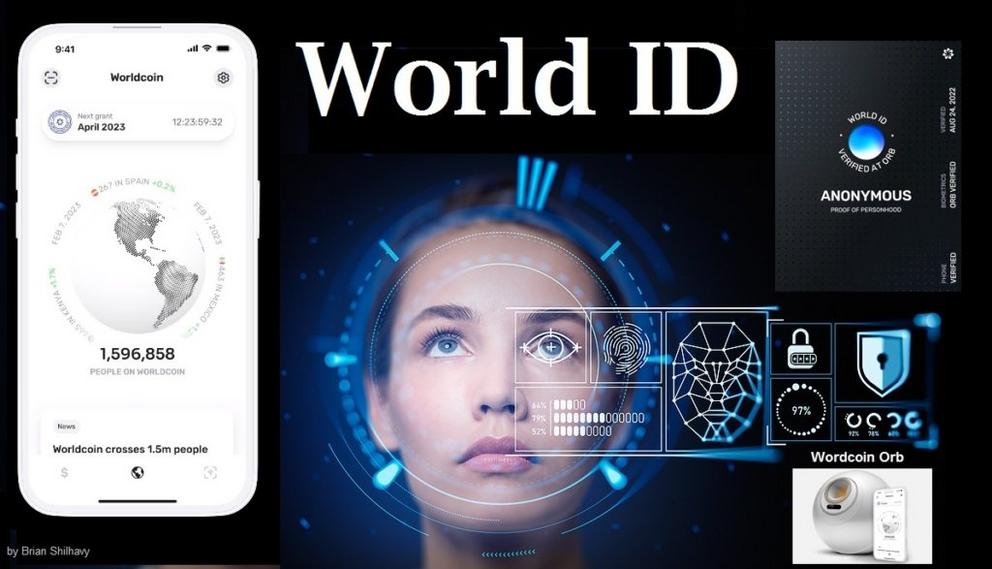
As I wrote above, the technology to require you to surrender your biometrics in order to access your money is already in place. Any bank or employer could implement it tomorrow, if they wanted to require you to supply a palm scan, face scan, eye scan, etc., in order to access your funds.
The federal government is already working on legislation to “regulate” this technology, including AI LLMs. The legislation is being written by the Technocrats themselves, and they will decide which companies are winners, and which ones are losers, as the entire financial system is on the brink of collapse.
So there is still time to resist, and put pressure on any financial institution that starts implementing such biometric IDs by pulling your money out of their banks, while you still can.
And if you value your privacy and freedom, STOP using their technology, and learn how to disconnect from the Internet.
Everything else in the media right now, which includes the corporate media, and the alternative media, is almost all a distraction to take your attention away from the imminent roll-out of these biometric ID programs.
Everything from UFOs, to Chinese biolabs, to EVERYTHING and ANYTHING related to politics that pits “liberals” against “conservatives,” including and especially the national elections of 2024, is ALL a distraction and psyop right now.
Also, things that are probably being planned and will most likely happen, but that are not imminent at this time, are also probably a distraction and psyop, and that includes the fear over Central Bank Digital Currencies (CBDCs), and things like 15-minute cities.
Yes, those types of things probably are being planned, but they will take time, perhaps years, to fully build and implement.
But the fear over such things makes excellent political talking points in the here and now, distracting you from the real, imminent dangers.
When politicians or candidates take a public stand against something like CBDCs, you know you are being manipulated and having your attention distracted from something, and you better look closely to find out what that is.
The #1 thing you should be thinking about and planning for right now, is what you are going to do when your bank or employer requires you to surrender the scan of some part of your body, or a sample of your blood or DNA, in order to keep getting access to your money.
Life on this planet has existed for thousands of years without the Internet and “smart devices”, and it is not that difficult to learn to live without these “conveniences” which will make you a slave to the system if you keep using them.
It is time to start investing in REAL relationships in REAL communities, not just “virtual” ones, and I will have more to say about this topic, and how to build a resistance movement, in future articles.
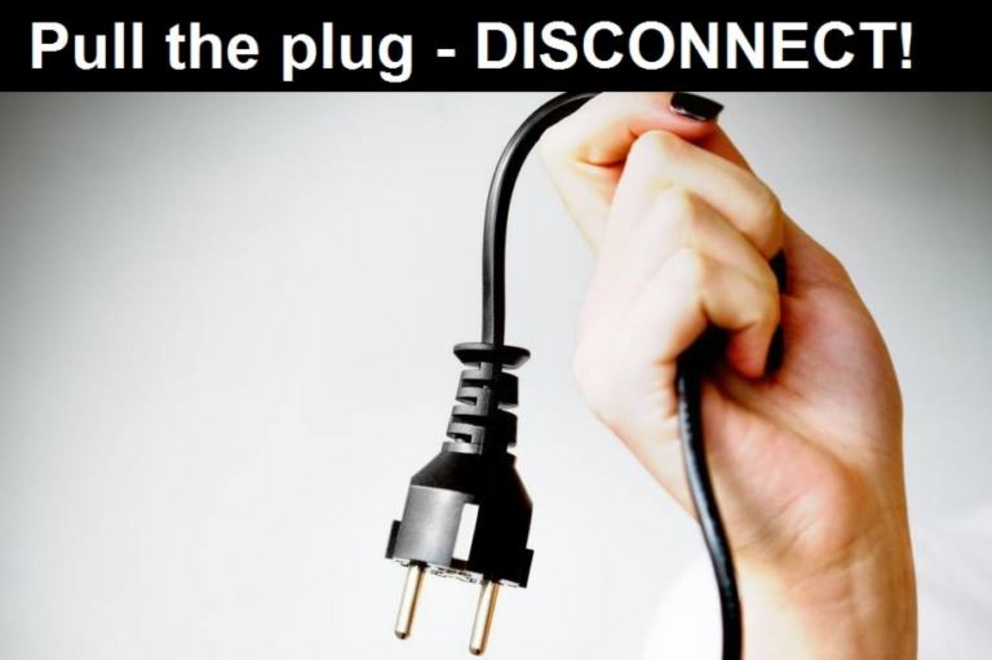
In the meantime, pull the plug and disconnect from the technology as much as possible. Stop building your own digital prison.
Learn how to live as FREE people, and not digital slaves.
You were bought at a price; do not become slaves of men. (1 Corinthians 7:23)

